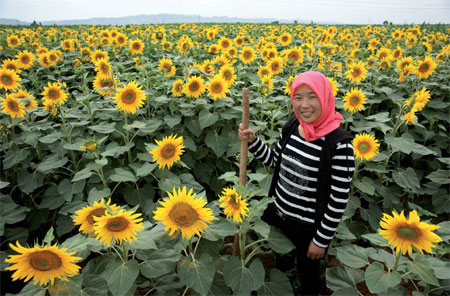Micro matters

| A woman in Ningxia grows sunflowers for a living. She has secured several micro loans from CreditEase and has got good returns. Photos Provided to China Daily |
| From left: Jerry Mao, partner of Lunar Capital; Zheng Jiansheng, president of Jinchuang Combined Gas Meter Co; and Tang Ning, CEO of CreditEase. |
"Exports and an investment-driven economy have proved to be unsustainable in the long run. So the government has turned to consumption for future development. This is definitely good news for MSEs," Gao says.
However, many MSEs feel they are often pushed around by the bigger firms. Zhao says he often faces pressure from upstream and downstream companies in his line of business. His company works mostly with publishing houses to translate novels or science books. "The publishers often tend to squeeze our profits, rather than treat us as equal business partners."
The MSEs also feel that academic institutions are not really supportive of their efforts to work on emerging technologies. Since many MSEs lack the talent or money to invest in research projects, they turn to institutes or universities for help. However, projects floated by the MSEs are usually specific, unlike those of state companies, so many institutes are reluctant to devote time or resources to such projects.
"It's hard to approach academic institutions," says a gas-meter manufacturer based in Wenzhou on condition of anonymity. "They either raise tough requirements for patents, or charge us a lot of money. I really hope they can serve society more by joining hands with us."
Financial strain
According to a World Bank report last year, China's state-owned companies receive massive loans thanks to state ownership of banks. Nearly 25 percent of these firms are in the red, and have an average productivity growth rate two-thirds lower than that of private firms.
MSEs are not so lucky when it comes to financing. Mao of Lunar Capital, who also invests in China-related projects in Italy, says unlike Italian banks, Chinese banks are not too keen on providing financial support to MSEs.
"Many of the MSEs we worked with had failed to get financing from Chinese lenders. The banks tend to ask land mortgage as collateral, something that most of the MSEs cannot provide."
Zheng Jiansheng is a typical case in this regard. He owns a gas meter company and last year its sales in domestic and overseas markets reached 100 million yuan.
Over the past few years, the company has exported gas meters to Europe, North America and the Middle East, and Zheng made quite a fortune from that. Now he is considering taking a further step: to acquire some companies in these mature markets to avoid the high logistics costs and other tariffs.
"The financial crisis has affected many European meter manufacturers. Most of them have quality products and the required certification to sell in Europe, and are keen on getting more capital from China."
Though the European bargains are tempting for micro entrepreneurs like Zheng, there are also several financial hurdles. Zheng recalls a recent incident that depressed him. During an investment summit he saw several North American gas supply companies on sale at a very low price, but when he paid visits to major Chinese banks for financing, they all turned him down.
"It is almost impossible to buy these companies by ourselves, as we don't have that much cash. Chinese banks don't support overseas mergers and acquisitions by MSEs as they feel 'it is too risky' or 'there are no government policies' for such cases."
The complicated and prolonged procedures required for getting financing for domestic business operations has also affected many MSEs. Most of the time it requires dozens of stamps and months of long waiting to get the required paperwork done. As a result, companies that are urgently in need of money often seek quick loans from usurers.
In Zheng's hometown Wenzhou, the city that has the largest number of MSEs, this option is very common. "It's quick and simple, although we have to pay high interest rates," Zheng says.
But once the capital chain breaks down, the result can be fatal. In the past two years, hundreds of business owners have fled, as they were unable to repay the loans.
This financial pressure is directly related to the transformation of China's economy, says Gao from Tsinghua University. "A decade ago the economy was so good that by just exporting T-shirts companies could make a fortune. But overseas demand has dropped since then and domestic competition intensified. So MSEs have to change their development route and add more value to their products, so that they have better chances of securing financing from banks."
Today's Top News
- Xi stresses improving long-term mechanisms for cyberspace governance
- Experts share ideas on advancing human rights
- Japan PM's remarks on Taiwan send severely wrong signal
- Key steps to boost RMB's intl standing highlighted
- Sustained fight against corruption urged
- Xi calls for promotion of spirit of volunteerism
































